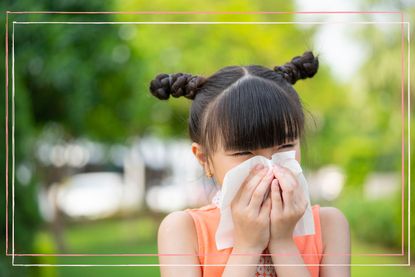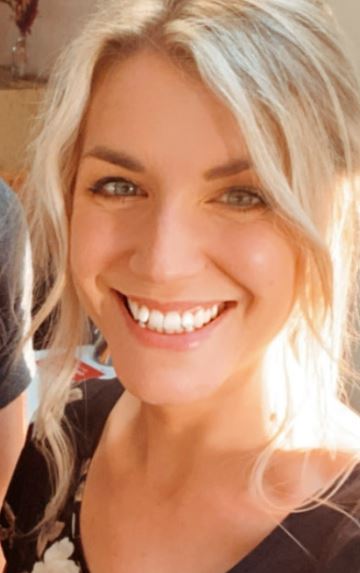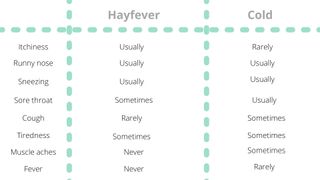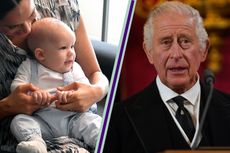What is the difference between hay fever and a cold in children and advice for easing symptoms from doctors
A GP and a paediatric allergy consultant and child allergy specialist explain the difference between hay fever and a cold and how to help your child if they are suffering from hay fever this season.


Knowing the difference between hay fever and a cold can help you identify your child’s symptoms and get them the right treatment.
According to Allergy UK, between 10-15% of children and 26% of adults in the UK have hay fever to some degree. Hay fever can affect babies as well as young children too, but spotting hay fever in children isn’t always easy, and Margaret Kelman, Research Nurse and Head of Clinical Services for Allergy UK, explained to GoodTo that hay fever symptoms in children are often missed because they are, "similar to those of a common cold".
To help explain the difference between hay fever and a cold in children, we consulted Paediatric allergy consultant and child allergy specialist Professor Adam Fox and GP Dr Vikram Murthy, who also shared their advice with us on how hay fever in children is treated and what parents can do at home to help ease their child's hay fever symptoms.
The information in this article is for general purposes only and does not take the place of medical advice. It is essential to be guided by your GP and take note of official NHS advice. As a parent, you know your child better than anyone and you should always trust your own judgement. If you are at all in doubt or you're worried about your child's symptoms, you should contact your GP. If your child has a temperature, their symptoms worsen or a rash appears, then it is crucial to seek personalised advice from a doctor as soon as possible.
What is the difference between hay fever and a cold in children?
Professor Fox explains that the main difference between hay fever and a cold is that one is an allergy and the other is a viral infection: "Hay fever is an allergy that is typically caused by a reaction to grass or tree pollens, as opposed to a cold, which of course is a viral infection."
As a result of this, the way that hay fever and a cold are treated are quite different. Whereas coughs and colds in babies and children will generally last a week or two at the most, and usually clear up on their own, hay fever will last longer (perhaps depending on the season and pollen count) and symptoms will be eased by treatment such as antihistamines.
"Hay fever will come on specific to the high pollen counts whereas colds can happen any time but are more common in the winter," explains Professor Fox. "The other giveaway is the response to antihistamines. Hay fever will respond and symptoms would improve for as long as they last, whereas they typically will not make any difference to the symptoms of a cold."
GoodtoKnow Newsletter
Parenting advice, hot topics, best buys and family finance tips delivered straight to your inbox.
In terms of the symptoms, Professor Fox explains that the main difference between hay fever and a cold is whether or not your child has a temperature. He says, "the giveaway for a cold would be a temperature, which ironically given the name ‘hay fever’ is never a symptom of hay fever."
"A cold will be quite quick in onset and last two to three days before settling and may have predominant symptoms of a cough, rather than hay fever where the predominant symptoms are nasal symptoms of nasal congestion, itching, and a runny nose with a clear mucus rather than a coloured thicker mucus typical of an infection.
"Commonly in hay fever, eyes will also be itchy which is not a typical feature of a cold."

In young children, these symptoms can be difficult to distinguish from other conditions or illnesses, so it's important to seek medical advice to get an accurate diagnosis if your child develops any of these types of symptoms, to rule out asthma or other medical conditions which may require medication or specific treatment.
How can I tell if my child has hay fever or if it's just a cold?
Two important clues to consider when trying to work out if your child might have hay fever instead of a cold are seasonality and symptoms.
Margaret Kelman of Allergy UK told GoodTo: "Typically babies and young children are likely to experience symptoms of hay fever during the pollen seasons in spring and summer months, depending on the pollen trigger."
Dr Murthy explains, "Hay fever is a common seasonal allergy causing sneezing, itchy eyes and coughing. Symptoms are usually present between March and September. You can also suffer from a runny or blocked nose, itchy throat and mouth and a loss of smell. You may also suffer from a headache and feeling generally tired.
"The common cold can also present with similar symptoms but…the main differentiating symptom between the two would be having a high temperature as this is common with the common cold and does not occur with hay fever."
So consider what time of year your child is suffering with their symptoms and whether or not they have common cold symptoms such as a high temperature, which would indicate they have a virus rather than hay fever. If in doubt, it’s always best to seek personalised medical advice for your child and make an appointment as soon as possible to see your GP.
How will a doctor diagnose hay fever in children?
If you think your child might have hay fever it is always best to make an appointment to see your GP and get a formal diagnosis and personalised medical advice.
Professor Fox explains that a doctor can check if your child has hay fever by considering the season, checking their symptoms and running a skin or blood test if necessary to confirm the diagnosis. "A diagnosis of hay fever requires not just typical clinical features of nasal symptoms such as sneezing, nasal itch, runny nose and nasal congestion together with eye symptoms but also the seasonality and the positive allergy tests. It is the allergy testing that will confirm the diagnosis, typically with either a skin test or a blood test to grass or tree pollen."
Dr Murthy adds about the tests you can have to check for hay fever, "You can undergo a IgE Rast blood test which can check for common allergens in the blood and can see if your child has any allergies. You can also have a skin patch test to check for common allergens too."
How do you treat hay fever in children?
Professor Fox explains that, "treatment is typically with over the counter measures, so this can include nasal sprays and pollen balms" but you should always consult with your GP first about what over the counter measures are safe to use for your child before purchasing.
Dr Murthy told us that while the main treatment for hay fever in children should be to try and not let them be too exposed to pollen, "there are child-friendly antihistamines available such as chlorphenamine maleate (Piriton)." Children should only take chlorphenamine that has been prescribed by a doctor.
It is essential to be guided by your GP and get personalised medical advice on what the best treatment is for your child based on their symptoms.
How can I help ease my child's hay fever symptoms at home?
Margaret suggests that parents monitor and be aware of the daily pollen forecast (available via the Met Office here) so that you can consider if it might be necessary to reduce the time your child spends outside "during peak hay fever times" if they have a particularly bad reaction to pollen or their hay fever symptoms make them especially uncomfortable.
Dr Murthy echoes this advice suggesting, "try to avoid being outdoors when the pollen count is at its highest," and also advising that you, "keep doors and windows closed at home when the pollen count is at its peak - especially if the grass is being cut outdoors." This will help keep the pollen out of your home where it could cause your child’s hay fever symptoms to flare up while they are indoors.
Professor Fox explained to us that the pollen count is typically higher at times of day such as dawn and dusk and on days where it is warm and a little breezy, so you can also consider keeping your child indoors at these times on high pollen count days to minimise their exposure. He also suggests, "Washing hair at night-time and avoiding drying clothes outside" to help ease your child’s hay fever symptoms.
The NHS also suggests the following for easing hay fever in general:
- put petroleum jelly (such as Vaseline) around your nostrils to trap pollen
- wear wraparound sunglasses, a mask or a wide-brimmed hat to stop pollen getting into your nose and eyes
- shower and change your clothes after you have been outside to wash pollen off
- keep windows and doors shut as much as possible
- vacuum regularly and dust with a damp cloth
- try to use a pollen filter in the air vents of your car, if you have one, and a HEPA filter in your vaccum cleaner
When should I take my child to see a doctor about hay fever?
If you think your child might have hay fever it is best to take them to see a doctor so your can get a formal diagnosis and personalised treatment plan.
Professor Fox also told us that taking your child to see a doctor about hay fever can ensure they get the right treatment, "Typically, hay fever does not begin until adolescence or early adulthood and developing hay fever symptoms in earlier childhood can be a sign that it is more likely to be persistent and troublesome. Typically, it is a good idea to take your child to the doctor about hay fever if over the counter medicines and antihistamines have not proven effective. Nasal sprays containing steroid, which can be very effective for more severe hay fever are only available for children through prescription."
What happens if hay fever is left untreated?
Taking your child to see a doctor if you think they have hay fever is important to get the right treatment and also to ensure that their symptoms don’t become too debilitating and begin to affect their everyday life.
Professor Fox says, "If hay fever is not adequately treated, it can cause not just irritating persistent symptoms but also have a very real impact on a child’s sleep and consequently on their mood and school performance."
Dr Murthy adds, "If the symptoms are left untreated the child could get frustrated and withdrawn and may not want to go outside as will associate the outdoors with negative experiences due to the ongoing symptoms."
Untreated hay fever can also increase the risk of developing asthma. Professor Fox explains, "Children with hay fever are at significant risk of developing asthma as they get older, for example about 50% of children between the age of 11 and 16 with hay fever will go on to develop asthma in the subsequent ten years. This can be reduced by certain innovative treatments such as desensitisation, which is a useful treatment modality for children with more severe hay fever despite being on regular medication."
Answers to further frequently asked questions about hay fever in children
Is there any way to prevent a child from getting hay fever?
"Unfortunately, there is not really any way to prevent children getting hay fever and we most typically see it in children who have an allergic tendency and commonly have eczema in early childhood," says Professor Fox. "Children with eczema and food allergies such as egg allergy are at particularly high risk of getting respiratory allergies such as hay fever in the order of about 80%."
Margaret Kelman of Allergy UK told GoodTo that "your child is more likely to suffer from hay fever if other close family members have allergies" and in these cases it would not be possible to prevent your child from getting hay fever.
Does hay fever in children ever go away?
Dr Murthy told us that in some cases a child may see their hay fever symptoms improve as they get older, "Your body will become sensitised to pollen over time and your body may adapt to the allergen and symptoms improve as you get older for about half of patients and in some 10-20% of patients their symptoms fully disappear as they grow older."
Disclaimer
The information on GoodTo.com does not constitute medical or other health advice or diagnosis and should not be used as such. Although GoodtoKnow consults a range of medical experts to create and fact-check content, this information is for general purposes only and does not take the place of medical advice. Always seek the guidance of a qualified health professional or seek urgent medical attention if needed.
Our experts

Professor Fox is a London-based Consultant Paediatric Allergist and is widely recognised as a leader in the field of Paediatric Allergy. He is one of few in the UK with higher training in this specialty and his key areas of interest include the management of the food allergy, the treatment of asthma, rhinitis (hay fever), eczema, and conjunctivitis, as well as allergies to drugs and insect stings. Professor Fox obtained a degree in Medicine and Neuroscience at the University of Cambridge and then undertook clinical training in Paediatric Allergy at University College London. Professor Adam Fox is currently working with FUSION™ Allergy Nasal Spray.

Dr. Vikram Murthy is a GP at Harley Street Doctor and the co-founder of Murthy Health. Dr Murthy studied at St George’s Hospital Medical School in Tooting and completed his medical training at St. Bart’s and The London School of Medicine and Dentistry. He has worked privately and in the NHS for nearly a decade, and continues to work in the NHS as a GP Partner and regularly supervises and trains junior doctors in the NHS.

An internationally published digital journalist and editor, Rachael has worked for both news and lifestyle websites in the UK and abroad. Rachael's published work covers a broad spectrum of topics and she has written about everything from the future of sustainable travel, to the impact of the coronavirus pandemic on the world we live in, to the psychology of colour.
-
 Do your kids make fun of you for your millennial ways? These are the 6 habits that GenZ believe make millennials ‘officially old’
Do your kids make fun of you for your millennial ways? These are the 6 habits that GenZ believe make millennials ‘officially old’The slang you use and how you wear your socks can all affect the way younger generations feel about your age
By Charlie Elizabeth Culverhouse Published
-
 Prince Archie’s fifth birthday wasn’t publicly marked by the Royal Family for one important reason
Prince Archie’s fifth birthday wasn’t publicly marked by the Royal Family for one important reasonThe youngster celebrated his fifth birthday with a garden party this week, but the royals didn't join in with the celebrations
By Charlie Elizabeth Culverhouse Published